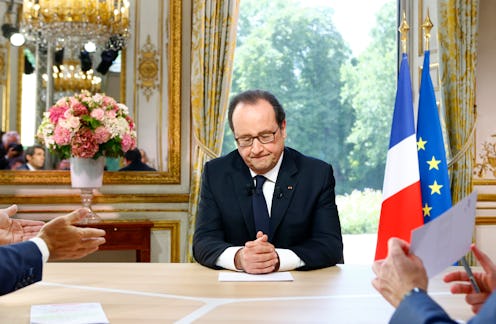News
Hollande Response To Nice Could Be Dangerous
Update: Early Saturday morning, ISIS released a statement announcing that one of their "soldiers" had carried out the attack. CNN reports that the statement read, in part: "The person who carried out the run over in Nice, France, is one of the Islamic State soldiers and carried out the operation in response to calls to target nationals of the coalition which is fighting the Islamic State."
Earler: In the wake of the Bastille Day attack in Nice, France, French President François Hollande held a press conference in Paris to apprise the nation of the situation and honor the victims lost in the deadly attack. While he was in an incredibly difficult and emotional position, President Hollande's response to the Bastille Day attack could be dangerous, not only for Niçois and French Muslims (many of whom were victims of the attack), but also for the French people as a whole.
During his press conference in Paris on early Friday, Hollande deplored the attack on France's independence day with a current death toll of 80 while raising the idea of "Islamic terrorism" to denounce this unthinkable attack. In the press conference, Hollande responded to the Bastille Day attack with a heavy heart:
Once again we have seen extreme violence and it is obvious that we must do everything to fight against this terrorism. France has been hit on its national day, July 14, our national symbol. France is in tears, she is hurting but she is strong. She will be stronger. Always stronger than the fanatics who wish to hurt us.
He also said that he was continuing France's state of emergency, declared in November after attacks in Paris killed 130 people, by three months, which could have potentially dangerous and detrimental implications on the people of France.
This declaration came two weeks before the July 26 deadline on which the state of emergency was supposed to be lifted. Under the state of emergency, French police are legally empowered to carry out raids and home searches without warrants from judges; this has caused many French activists to protest the decision, which was extended again after its first deadline in February.
In addition to extending the state of emergency, Hollande said he would continue the French presence in Iraq and Syria and called upon French reservists to "relieve" French police who'd worked under the eight-month-long state of emergency. According to The Guardian, Hollande was referring to the reservist program known as "Operation Sentinelle," created after the Charlie Hebdo attacks in January 2015 and reinforced after the Paris attacks, that beefs up French security forces to help fight terrorism on French soil. Amid claims of police militarization in the United States, France's "Operational Sentinelle" raises equal concerns as 10,000 armed police and soldiers patrol the streets of France.
While the French police seem to have less of a propensity to murder minorities than their American counterparts, there are significant human rights concerns related to the extended state of emergency, which will, by the October deadline, have been in place for 11 months. Earlier this year, Human Rights Watch reported 18 cases of human rights violations, including arrests and raids of innocent people at the wrong addresses. Even the United Nations warned against human rights violations following extreme "anti-terrorism" strategies like those under France's state of emergency.
During times as trying as these, governments find themselves in uniquely difficult positions when trying to protect their citizens. Unfortunately, in France (and other Western countries), the rights of some citizens seem to not only be placed over those of others, but those rights are continually infringed upon in an attempt to squash terrorism. May the horrific Bastille Day attack and all those that came before, and will come after, not be used as an excuse to further infringe upon the rights or lives of vulnerable minorities.
